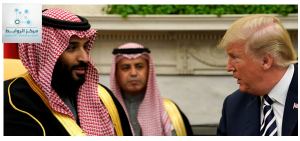Dr.Salim M.Al Zanoon
The Israeli position on Saudi Arabia’s attempt to build nuclear reactors has changed radically, moving from absolute opposition to conditional approval. Four months ago, Netanyahu told Trump that he opposed Washington’s intention to transfer nuclear reactors to Saudi Arabia. But last week, a set of conditions were transferred to Trump’s administration for agreeing to a nuclear deal between Washington and Riyadh.
Determinants of change.
A number of factors / determinants have contributed to modifying the Israeli position on the nuclear deal between Washington and Riyadh and moving from rejection to conditional approval. Most of these factors are linked to the economic revenue, the multiplicity of actors in the nuclear market, and the confrontation of Iranian influence:
Tel Aviv’s realization that it will not be able to obstruct the nuclear deal, given the great economic return that Washington will gain from the deal.
Multiple options in the nuclear market. If the deal with Washington is obstructed, Riyadh can contract with others such as China and Russia.
The survival of the deal with the US allows Israel to see the details and the progress and the development of the work, including the degree of enrichment, as contrary to contracting with other countries.
Israel’s desire to strengthen the capabilities of the Sunni countries in the face of Iran’s common influence, provided that it is under control, and does not break the equation of regional superiority of Israel.
Apply the concept of the sunk cost.
Israel has worked and made its decision based on the application of the concept of “sunk cost” to the political sphere, and the sunk cost , economically is the losses incurred in the past to obtain a particular service not realized .Politically, in the Israeli case, Israel sought to prevent Iraq, Syria and Iran from obtaining nuclear capability However, these countries developed their capabilities in isolation from the US and Israeli control. In the end, it cost Tel Aviv a large military and political price, so it decided to exempt itself from the cost of sunk costs and to develop a policy contrary to the past that its features appeared in the Saudi model based on conditional approval, in an attempt to put red lines on the deal, Israeli minister of energy transferred it to his US counterpart, and centered around five key elements:
First: coordination and transparency between Washington and Tel Aviv on negotiations with Saudi Arabia.
Second: Knowing the expected location of the Saudi reactors.
Third, there should be no possibility of uranium enrichment by Saudi Arabia.
Fourth, the United States should be the only supplier of fuel used to operate reactors.
Fifth: The United States to remove the used fuel currently existed in Saudi possession to ensure that it is not used to enrich uranium.
A number of factors / determinants have contributed to modifying the Israeli position on the nuclear deal between Washington and Riyadh and moving from rejection to conditional approval. Most of these factors are linked to the economic revenue, the multiplicity of actors in the nuclear market, and the confrontation of Iranian influence:
Tel Aviv’s realization that it will not be able to obstruct the nuclear deal, given the great economic return that Washington will gain from the deal.
Multiple options in the nuclear market. If the deal with Washington is obstructed, Riyadh can contract with others such as China and Russia.
The survival of the deal with the US allows Israel to see the details and the progress and the development of the work, including the degree of enrichment, as contrary to contracting with other countries.
Israel’s desire to strengthen the capabilities of the Sunni countries in the face of Iran’s common influence, provided that it is under control, and does not break the equation of regional superiority of Israel.
Apply the concept of the sunk cost.
Israel has worked and made its decision based on the application of the concept of “sunk cost” to the political sphere, and the sunk cost , economically is the losses incurred in the past to obtain a particular service not realized .Politically, in the Israeli case, Israel sought to prevent Iraq, Syria and Iran from obtaining nuclear capability However, these countries developed their capabilities in isolation from the US and Israeli control. In the end, it cost Tel Aviv a large military and political price, so it decided to exempt itself from the cost of sunk costs and to develop a policy contrary to the past that its features appeared in the Saudi model based on conditional approval, in an attempt to put red lines on the deal, Israeli minister of energy transferred it to his US counterpart, and centered around five key elements:
First: coordination and transparency between Washington and Tel Aviv on negotiations with Saudi Arabia.
Second: Knowing the expected location of the Saudi reactors.
Third, there should be no possibility of uranium enrichment by Saudi Arabia.
Fourth, the United States should be the only supplier of fuel used to operate reactors.
Fifth: The United States to remove the used fuel currently existed in Saudi possession to ensure that it is not used to enrich uranium.
Given the US historic experience of ensuring Israel’s security and its promise of regional supremacy, Washington is likely to take Israeli demands into account when concluding the nuclear deal with Riyadh.
Regional Studies Unit
Rawabet Center for Research and Strategic Studies

